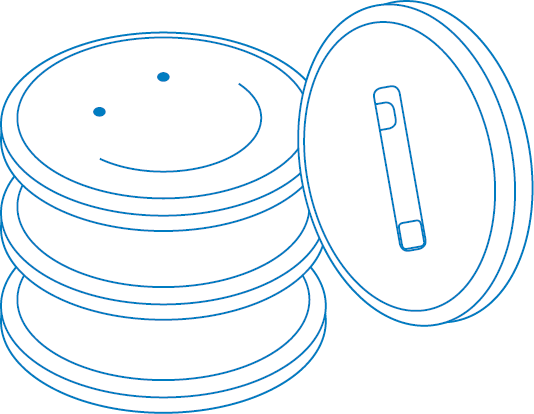
Annual Report
INDUSTRY 4.0 COMES OF AGE: THE SMART BUTTON FACTORY PROJECT

It was first presented to the public in October 2019: The Smart Button Factory constructed by SICK AG trainees and students on sandwich courses. What began as a practical project for up-and-coming talent is now being further developed – and may even become a teaching device at schools.
Everybody’s talking about Industry 4.0 – and SICK even has a trainee project on it: Working with their trainers, about 50 trainees as well as students from dual-studies vocational colleges constructed the Smart Button Factory – a robot arm plant that automatically produces name badges – over a period of one-and-a-half years.
“The initial question was: How do we teach our trainees about Industry 4.0 so that they are ideally equipped for the job market?” explains Philipp Burger, a Training Manager at SICK AG. “Some companies purchase ready-made platforms for this purpose. But we wanted to implement it ourselves using our own sensor technology, especially as we already had all the job profiles and study programs that we would need to develop such a plant in-house. Training here is anyway mainly organized in project form.” A most suitable and sensible project, therefore, during which trainees could develop their Smart Button Factory themselves right from the start. “The learning effect could not be better,” Burger is convinced. “And we constantly need name badges – which have had to be manually produced up to now. So the plant really does provide added value and ease the workload.”
»THE YOUNG SPECIALISTS WERE SUPPORTED
BY THE CENTRAL UNIT MANUFACTURING SOLUTIONS«
What initially sounded relatively simple became the longest, largest and most complex training project ever carried out at SICK. Julian Sütterlin, Project Manager for the Smart Button Factory, explains: “We divided the project up into different work packages that were then distributed among the trainees and their trainers.” The young specialists were supported by the Central Unit Manufacturing Solutions, a department dedicated to the construction of comparable plants. Other specialist departments, however, were also always available to provide advice and assistance, for example for the creation of the safety concept. Trainees and students studying mechanics, mechatronics, IT and technical product design at dual studies vocational colleges were directly involved in the development and construction of the Smart Button Factory. One of them is Jonathan Adler, trainee IT specialist for application development: “It was a very exciting project,” he recalls. “I found the hands-on treatment of Industry 4.0 and working within the project environment particularly valuable experiences that have helped me personally and professionally.” The trainers also learnt something: “The great thing was that we were facing a completely new task that we had to solve with these young people,” says Sütterlin. “For us too this was the first project with a robot, and we had never had any experience of this before.” But the hard work was worth it: The team achieved its main goal of presenting the Smart Button Factory in public for the first time at the Science Days at the Europa Park in Rust, Germany, in October 2019.
The plant is currently located at the Gisela Sick Education Center in Waldkirch and diligently produces individually designed round and rectangular name badges. These can be ordered on a website via a mobile phone, tablet or computer using a day code – to prevent unauthorized orders. Incidentally, the website was also part of the project, and the participants programmed it themselves.
Whoever thinks that the story of the Smart Button Factory is now over is mistaken: SICK is currently examining whether it offers sales potential as a learning unit for schools. Vocational school teachers who have heard about the project from SICK’s trainees have approached the company and expressed interest in such a plant for teaching purposes. An accompanying teaching concept, as well as after-sales support from SICK, however, would be prerequisites for marketing to schools. “We are at the very beginning of our considerations here, and we need to find out exactly what schools require and whether, and how, these needs can be met,” says Philipp Burger.
»THE SMART BUTTON FACTORY WAS NOT JUST A ONE-OFF TRAINING PROJECT,
BUT IS IN ALL RESPECTS AN ACTIVE PLANT WITH WHICH WE WILL ALL CONTINUE TO LEARN.«
Regardless of whether the Smart Button Factory will soon be available at schools as a teaching device for Industry 4.0 – its story at SICK is far from over: It will undergo continuous optimization and development as part of further trainee and student projects. Thus, for example, new sensors will be integrated or the stamping technology improved. It is also conceivable that the plant could use artificial intelligence to determine whether rectangular or round badges are required. Expansion of the website and visualization of the production process on the internet via a live stream are in the planning stage. Burger and Sütterlin agree that: “The Smart Button Factory was not just a one-off training project, but is in all respects an active plant with which we will all continue to learn.”
Public presentations of the Smart Button Factory – at “Jugend forscht” (a youth research competition) in mid-February and for the Federal Ministry for Economic Affairs and Energy in early March – were complete successes, convincingly demonstrating just how practical and demanding training at SICK AG is.

Imprint | General Terms and Conditions | Terms of use | Dataprotection | © 2024 SICK AG